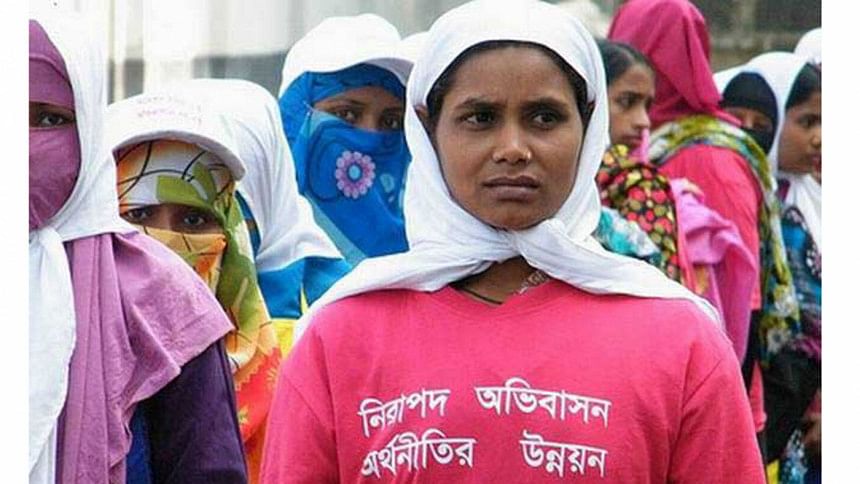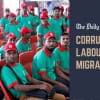Women on the move

Bangladesh has a long tradition of activism against gender based discrimination. By some accounts, it's as old as similar traditions in more developed countries, which have since achieved a good degree of parity between the sexes in areas like civil liberty, freedom, education and employment. It's therefore a happy coincidence that the UN's 16 days of Activism Against Gender Based Violence run through and end right after the very day Bangladesh sets aside to pay its respects to Begum Rokeya Sakhawat Hossain, a pioneering champion of women's equality in the region and someone who stood up for women during a time when feminist notions were new, anywhere in the world. Begum Rokeya pushed for economic equality between men and women and she might have been pleased to see that today both men and women from Bangladesh are travelling overseas in search of work.
However, employment-related migration is a recent phenomenon for Bangladeshi women. Until 2004, only 1 percent of labour migrants from Bangladesh were women but this increased rapidly to 19 percent by 2015, much faster than the institutional mechanism has been able to keep up, leading to a range of issues particular to female migration being inadequately addressed. Some of these issues are common to both men and women, like access to health care and information, low wage rates, but some, particularly related to skills, education and justice, are slightly more specific. Women are also subject to different risks, including physical, sexual and verbal abuse as domestic workers, who make up the bulk of Bangladeshi women going overseas for work.
Many migrant women are excluded from social and legal protection as domestic work is rarely covered under labour legislation. This is further complicated by the fact that Bangladesh hasn't ratified the Domestic Workers Act itself, making it difficult for the government to require the same of destination countries. Women migrant workers (domestic workers) are frequently confined to the employer's home, often with no means of communication, social support or security. They also endure lengthy working hours, are paid low wages, and have their papers confiscated.
There are a number of factors that keep migrant women in a perpetual state of vulnerability. Firstly, they are often from rural environments and are unable to operate optimally in a more sophisticated domestic environment. They struggle to handle appliances, be it washing machines and microwaves, or function in a foreign cultural and linguistic context, and are mistreated because of this. Secondly, their virtual isolation means they have limited social contact and are entirely at the mercy of their employer's whims, with little or no recourse to support. Finally, there is an absence of structures like helplines, associations and legal assistance to which they can turn.
The government of Bangladesh has attempted to address these by establishing Technical Training Centres (TTC), where IOM supported the introduction of domestic workers' training curriculums and equipment. The government has also appointed an expanding pool of designated Labour Attachés in diplomatic posts to provide support to overseas migrants; again the IOM has supported this initiative. The IOM also provides pre-departure orientation packages to help migrants find their way in a new environment and reaches out to local NGOs in destination countries so that they can provide some support. Domestically, entities like the Bangladesh Obibashi Mohila Sromik Association (BOMSA) and Obhibashi Kormi Unnayan Programme (OKUP) also exist to protect the welfare of migrants.
But more needs to be done. Clearly defined policies and implementation systems to ensure the protection, rights and well-being of women migrant workers are required. These need to be applied to protection clauses in bilateral agreements to guarantee safe working conditions and access to a support system and health services. Embassies overseas should provide socialising opportunities for women migrants so that they can leave their employers' houses and have access to their Labour Attachés, as well as to a community support structure. Recruiting agencies should also play a stronger role is securing better working conditions from companies in destination countries.
The other area of focus is economic opportunity. According to an IOM study (Returnee Female Migrant Workers of Bangladesh – Insights into Improving the Employment Experience and Opportunities in Reintegration, 29 January, 2014), as many as 67 percent of female migrants had no training experience prior to going abroad. But, females migrating for work constitute an important potential source of income for Bangladesh. They can contribute to economic growth by easing pressures in the local job market, but most importantly, it has been found that female migrant workers tend to remit a greater share of their earnings than men. Currently, investments in building a skilled female workforce remain limited, leading to the under-utilisation of migrant women's potential to contribute to local and national development, since they are only able to avail of the lowest paid jobs.
Women migrants with a low-level of skills and education are also less able to claim their rights and are at a higher risk of exploitation. They are more likely to be employed and (be forced to) accept working in unsafe and unregulated sectors as they rarely have an alternative.
Recognising the woman migrant worker's potential contribution to local and national development and upgrading current policies, including the National Skills Development Policy 2011, the National Women's Development Policy 2012, and the Overseas Employment and Migrants Act 2013, will be a beneficial situation for everyone - the migrant, the country and the overseas employer.
Even the simple act of providing a certification of prior learning for skills picked up during a previous job can give migrants better bargaining power and access to higher paying jobs the second time around. Often, migrants have picked up language and technical skills that could put them in a higher bracket instead of having to reapply as unskilled labour.
Bangladesh has made great strides in creating domestic opportunities for women in the workforce. With overseas employment becoming a rapidly growing sector, the country has a renewed responsibility to affirm its commitment to the ideals of visionaries like Begum Rokeya.
The writer is Chief of Mission, IOM Dhaka.

 For all latest news, follow The Daily Star's Google News channel.
For all latest news, follow The Daily Star's Google News channel. 








Comments